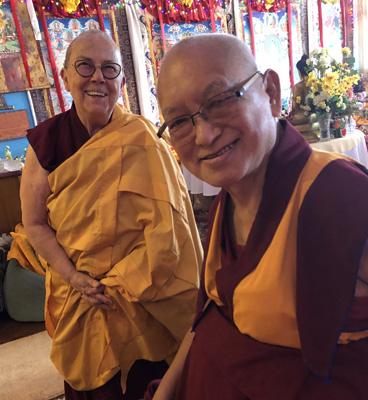Having a Good Heart
Lama Zopa Rinpoche discusses the importance of practicing bodhicitta and the good heart in this teaching excerpt from Lecture 1 of the 52nd Kopan Course held at Kopan Monastery, Nepal, in November-December 2019. Lightly edited by Gordon McDougall.

As I already mentioned, what makes life most meaningful, most beneficial, not only to us but to every sentient being—to every insect, to every ant you see here, to every sentient being—is bodhicitta. Put effort into that. Our main goal should be to practice that.
There are so many practices, so many meditations, but don’t miss bodhicitta. Write it down in your diarrhea book! Write it down to remind you. Then each time you see it, it reminds you what is your main practice. If somebody asks you what your main practice is, you should say bodhicitta. Bodhicitta! What makes life most happy is bodhicitta.
There are two wings in Buddhism. Both method and wisdom, bodhicitta and emptiness, are important, but without bodhicitta the highest we can achieve is only lower nirvana not enlightenment. With bodhicitta and emptiness, we can cease the subtle obscurations and then achieve enlightenment. So, they are like the two wings. Therefore, bodhicitta is what makes life most happy.
In the West, day and night people ask, “When I can be happy? When I can be happy?” Like Tibetans reciting OM MANI PADME HUM, OM MANI PADME HUM, Western people recite, “When I can be happy? When I can be happy? When I can be happy?” Because of so much clinging, so much cherishing the I, they encounter many problems. The self-cherishing thought brings so many problems. Then they face problems with people. Even if they stay alone, there are problems with dogs and birds making noise outside. Everything becomes a problem.
Therefore, what makes the happiest life is bodhicitta. You must know that. Everybody must know that. At least write it down! If we want to have happiness, what makes the happiest life is bodhicitta. That is what we should study and practice as much as possible. Practice bodhicitta!
Through lamrim, we are able to reach bodhicitta in this life. We must understand the goal, the direction we must take. If we want to not only be free from the oceans of samsaric sufferings but to achieve enlightenment to free the numberless sentient beings from the oceans of samsaric sufferings and bring them to enlightenment, this is what we must do. “I’m this deity; I’m that deity,” “I’m a dzogchen practitioner; I’m a dzogrim practitioner.” Or stating some very high tantric meditation to impress people, making them think we are a very high realized being. [Instead, we must strive for bodhicitta.]
I have to mention this. We need a good heart. Even if we don’t believe in reincarnation and karma and so forth, we need to have a good heart in our everyday life, not only for people but for animals. If we see animals such as ants, we should never step on them. If we kill one, then for five hundred lifetimes we will be killed; we will get stepped on by other sentient beings. By killing that one time, karma has that effect; we get killed for five hundred lifetimes. That is just a simple example showing how we should be very careful to not harm even small things like that.
What was I saying? I’ve forgotten what I was talking about. We should not only not harm people but even animals. I forgot. What was before? What was I talking about before? [Ven. Holly: Having a good heart.]
Practice having a good heart as much as possible. That is most important in our life, even if we don’t believe in reincarnation and karma.
Even if we are very learned, knowing all the Buddha’s teachings, the Kangyur of more than a hundred volumes and the Tengyur, all the commentaries of the pandits of Nalanda—even if we know everything by heart, the most important thing is to practice a good heart. If we don’t practice a good heart, even if we are so learned, explaining this and that, we develop pride, we develop ego, attachment, grasping the I, the self-cherishing thought. And then, anger. If somebody does something a little bit negative toward us, saying we are not correct or something or criticizing our way of acting, we suddenly get angry. And then, when we die, because we haven’t practiced a good heart, we get reborn in the lower realms.
Whether we know just this much Dharma, [Rinpoche indicates with his hands] just a small [amount], practicing a good heart as much as possible with people and animals, trying to help wherever we can, making our life meaningful in the world, day and night being kind to everybody—animals, insects, human beings, everybody—that is the best. Then, we will succeed in all our wishes for happiness; all the good qualities, all the realizations come.
In the Sutra of Chenrezig Purely Containing All Dharma it says,
Do not follow many Dharmas.
Follow one Dharma.
What is that?
That is great compassion.
With great compassion, all the buddhas’ qualities will come to you without effort.
If we want to achieve enlightenment quickly, we must practice the one Dharma, great compassion. The “one Dharma” is great compassion. If we practice great compassion, all the buddhas’ qualities will come to us without effort.
Write it down! Write this down in your diarrhea book! It is so important, so important. You have to know what the most important practice in life is. You must know that. “With great compassion, all the buddhas’ qualities will come to you without effort.” You must write it down! Then you know what is the most important practice. If you practice that one, everything comes to you.
